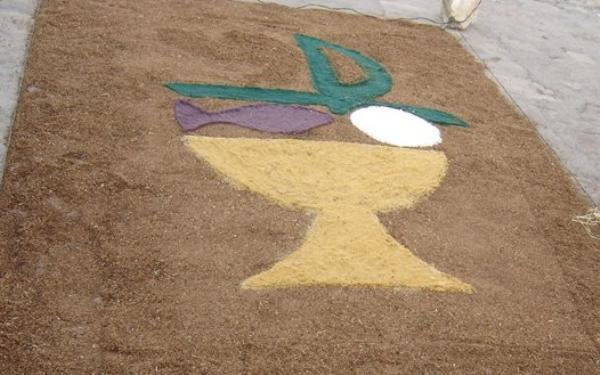The Edinburgh 2010 International Mission Conference took place last week, bringing together 300 delegates of different Christian denominations from sixty countries. Yesterday, at the close of the conference, the international Catholic delegation was welcomed at the Sacred Heart Church, Edinburgh, for the Mass of Corpus Christi. Fr James Crampsey SJ preached on what mission means today, in the context of the feeding of the five thousand and its place in Luke’s Gospel.
I’ve reached the stage in life where if I have an idea, I must immediately write it down before I forget it. So a few months ago, I wrote down this phrase: ‘Mission is the heartbeat of the Body of Christ’, thinking that it might combine the Mission conference, the feast of Corpus Christi and the Church of the Sacred Heart.
The other thought that popped in to my head was a memory of being at home in Glasgow around Christmas time. I was watching the Scottish News, and there was an interview with the Chief Constable of Angus. As he warned the audience about the dangers of drinking and driving, he came up with the memorable phrase, ‘Hospitality is rife at this time of year’. Hospitality (in its best sense) is offered by Melchizedek to Abraham in our first reading (Gen 14:18-20) and is an important theme in the Gospel of Luke and the Acts of the Apostles. So I’d like to explore hospitality as a way in to our celebration today.
When the Holy Spirit authorises the proclamation of the Gospel in Europe, the first person to hear the preaching of Paul in the open space by the river is Lydia (Acts 16:14). In thanksgiving for receiving the word and the baptism which follows, she invites the missionaries to come and stay at her home. As she is a Gentile and they are Jews, the hospitality that she offers them takes them out of their comfort zone. Preaching by the river is not the same as crossing an unknown threshold, as entering a house with all the difficulties about sharing food which from one side is seen as unclean.
Chapters nine and ten of Luke’s Gospel, with the sending out of the twelve and the seventy two, with the parable of the Good Samaritan and the story of Martha and Mary, give a rich description of the importance of hospitality. At the beginning of chapter nine, where today’s gospel comes from, the twelve, whom Jesus has chosen, drawn near to his heart, receive a mission to proclaim the Kingdom of God. The twelve are told to rely on the hospitality of the people they go to, not to take the insurance of an extra cloak to sleep in if nobody takes you in, not to take extra money in case nobody takes you in. Rely on the hospitality offered to you, is Jesus’s instruction. Receive well what is given to you out of hospitality.
The gospel we have just heard is the other side of that. People come to hear Jesus proclaim the Kingdom, they have not provided for themselves. Too bad, say the twelve, let them go off and sort it out. They have come to you, says Jesus, it is time for you to offer the hospitality you have received. If you offer all you have, you will see that it is more than enough, as can be seen from the twelve baskets.
And maybe that final phrase can serve as one way of expressing the action of the last supper, which Paul calls to mind in his first letter to the Corinthians. Jesus has offered all that he has; we see that it is more than enough.
The two actions of the speaking of the word and the breaking of the bread are the actions which are expressive of the mission and unity of the Church. We hear those actions come together in Luke’s account of the journey to Emmaus. There is a curious moment when the disciples are telling Jesus about Jesus, and they get it so wrong: ‘O slow of heart,’ says Jesus as he uses what they know (the Hebrew Scriptures) to prepare them to understand, to prepare them for the moment when they get in touch with the feeling that their hearts are‘burning’. There is an old English word for resurrection, quickening. The slow heartbeats of the disciples are quickened by the words of the risen Jesus.
They already sense it without completely understanding it, so they offer hospitality to Jesus, and from one of the simple building blocks of hospitality, the bread which Jesus breaks, everything comes together in a moment of recognition. Now the disciples are giving hospitality to the word to be proclaimed, and they carry this word in the rhythm of their own heartbeat, with care and joy all the way back to Jerusalem. ‘Jesus is risen’. Their proclamation is echoed:‘he is risen indeed and has appeared to Simon’. This coming together of proclamation and echo, of proclamation and resonance, picks up a very important phrase from when Jesus sends out the seventy-two in chapter ten of the gospel: ‘he sent them on ahead of him in pairs to every town and place where he himself intended to go.’
The pair come back to Jerusalem from Emmaus, and find that Jesus has already been there. There is a wonderful coming together of the shared proclamation and experience. In contemporary mission, we look for something both similar and different. In the people to whom we take the message we look for the same echoing Spirit who lives in us who are entrusted with the message.
There is a final passage of the sending out of a twosome that may be relevant:
Then came the day of Unleavened Bread, on which the Passover lamb had to be sacrificed. So Jesus sent Peter and John, saying, ‘Go and prepare the Passover meal for us that we may eat it.’ They asked him, ‘Where do you want us to make preparations for it?’ ‘Listen,’ he said to them, ‘when you have entered the city, a man carrying a jar of water will meet you; follow him into the house he enters and say to the owner of the house, “The teacher asks you, ‘Where is the guest room, where I may eat the Passover with my disciples?’” He will show you a large room upstairs, already furnished. Make preparations for us there.’ (Lk 22:7-12)
The mission is to be sent, to meet those we do not know with an openness of heart and to receive hospitality. We prepare together with those whom we meet, with those to whom our hearts go out and beat in tune, that common ground where Jesus himself will come to break the bread. And it will be more than enough.
Fr James Crampsey SJ is Parish Priest of the Church of the Sacred Heart, Edinburgh.






